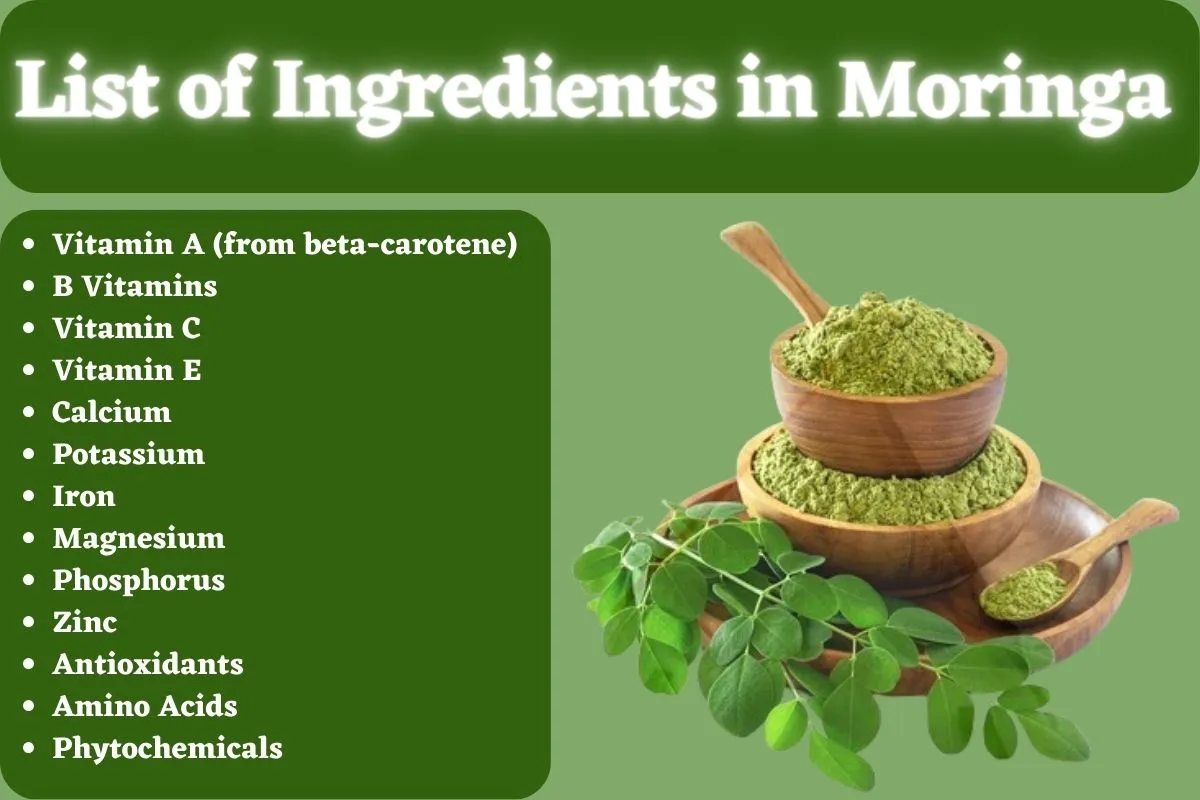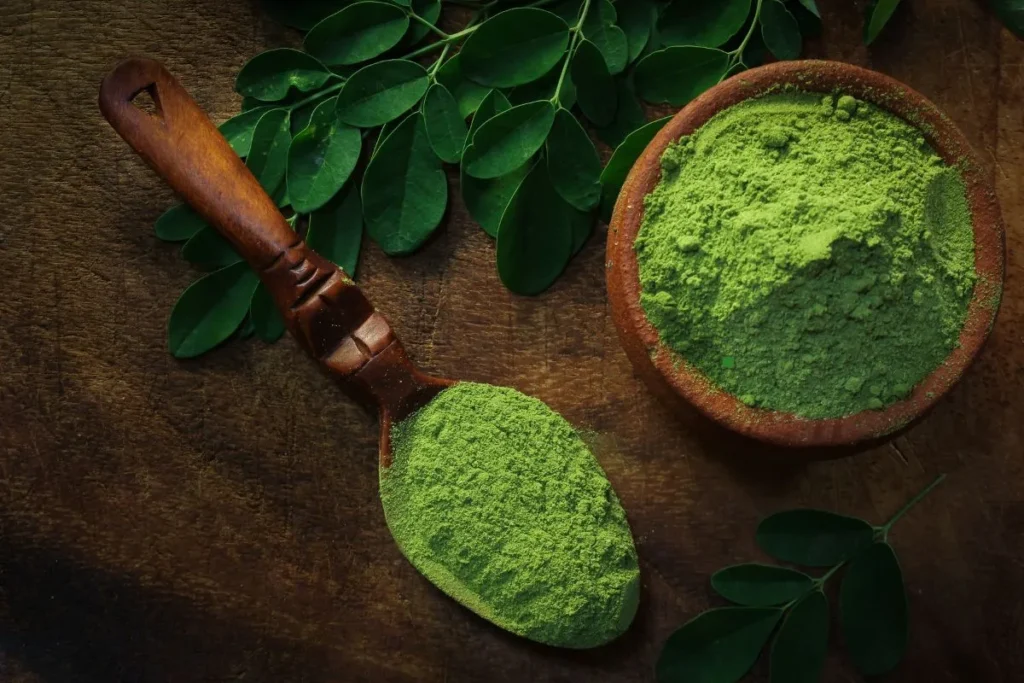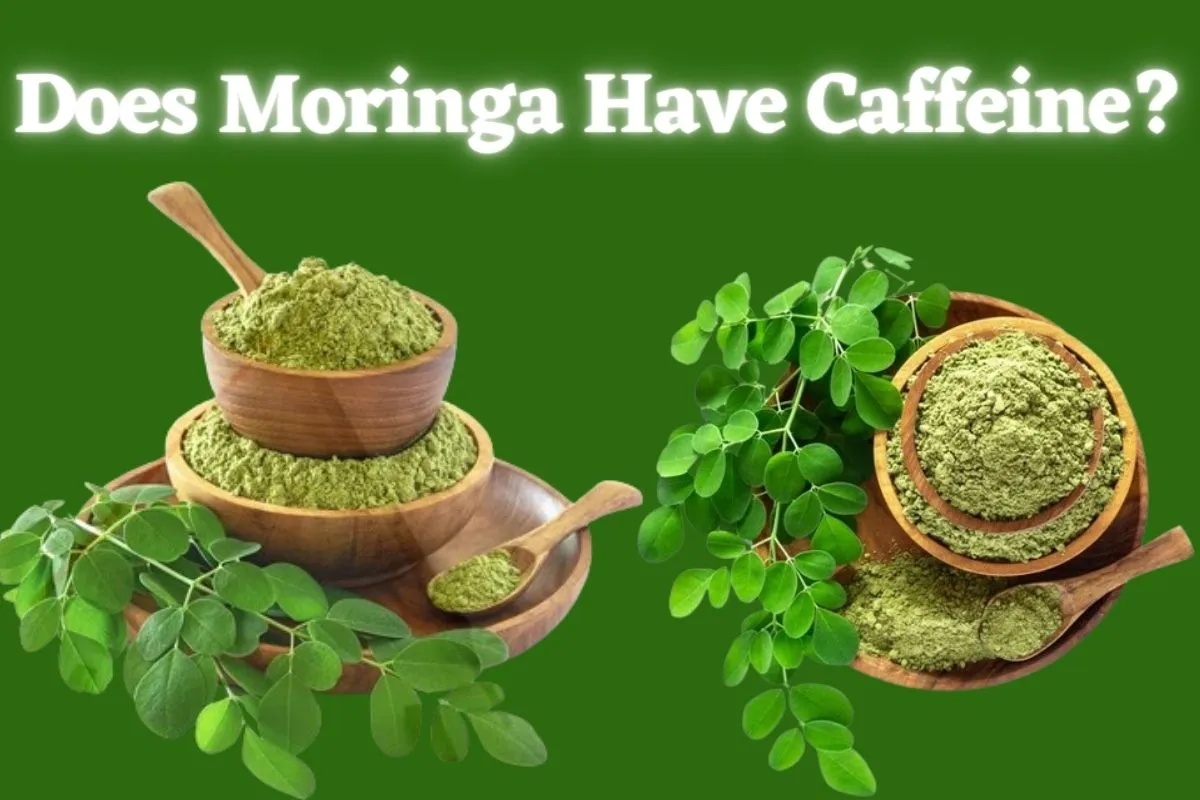The “miracle tree,” moringa, has been increasingly well-known in recent years due to its many health advantages. Native to regions of Asia and Africa, this adaptable plant has been utilized for ages for its nutritional benefits and therapeutic qualities.
Does Moringa Have Caffeine? One topic that comes up a lot among people who are concerned about their health is whether or not moringa contains caffeine.
Importance of Knowing Caffeine Content in Moringa
Moringa oleifera, also known as the drumstick tree, finds its way into diets around the world in a surprising number of ways. Globally, the leaves are most commonly consumed fresh, dried, or powdered into smoothies, soups, and stews.
Their nutritional punch makes them a valuable addition to meals, particularly in regions where food insecurity is a concern.
Moringa offers a variety of potential health benefits, which is why it’s often referred to as a “superfood”. It boasts a remarkable nutritional profile, rich in vitamins A, C, and B6, as well as essential minerals like calcium, iron, and potassium.
Furthermore, it’s packed with antioxidants, including quercetin and chlorogenic acid, which help protect against cellular damage caused by free radicals.
For individuals sensitive to caffeine or those watching their overall caffeine consumption, understanding the levels in moringa products allows for informed choices and helps them stay within their desired limits.
Does Moringa Have Caffeine?
No, Moringa is caffeine-free. Moringa does not naturally contain caffeine, in contrast to coffee, tea, or other caffeinated beverages. Because of this, it’s a great option for people who want to cut off caffeine from their diet.
Despite being caffeine-free, Moringa offers a natural energy boost and a plethora of health benefits due to its rich nutritional profile, including vitamins, minerals, antioxidants, and amino acids.
However, individuals should be mindful of potential interactions with medications and seek professional advice before incorporating Moringa into their daily routine.
Moringa Variants and their Caffeine Content
Here are some popular Moringa drink variants that are also caffeine-free:
- Moringa Tea: To prepare a nourishing and revitalizing tea, dried moringa leaves are soaked in hot water. It tastes great either way, but for a delicious variation, try it with some extra flavors like lemon or honey.
- Moringa Smoothie: For a smooth and nutrient-dense smoothie, mix fresh or powdered moringa leaves with fruits like mangoes, bananas, or berries with yogurt or milk. Adding ingredients like spinach, kale, or avocado enhances the nutritional value even further.
- Moringa Latte: To make a smooth and creamy Moringa latte, whisk together steaming milk (vegan or dairy) and a small amount of sugar. This hot drink is a delightful treat at any time of day, but it’s especially great on chilly mornings.
- Moringa Juice: Combining Moringa with ingredients like apples, carrots, ginger, and lemon adds flavor and additional health benefits to the juice.
- Moringa Lemonade: Moringa powder can be added to homemade lemonade for a refreshing and antioxidant-rich beverage.
- Moringa Iced Tea: Brew Moringa tea and allow it to cool before serving over ice for a refreshing and hydrating drink.
- Moringa Energy Drink: Blend Moringa powder with coconut water, pineapple juice, and a dash of lime for a revitalizing energy drink. This tropical-inspired beverage provides a natural boost of energy and is perfect for pre- or post-workout hydration.
- Moringa Herbal Infusion: Combine dried Moringa leaves with other herbs such as peppermint, chamomile, or lemongrass to create a fragrant and soothing herbal infusion. This caffeine-free beverage is perfect for relaxation and promoting overall well-being.
List of Ingredients in Moringa

Moringa oleifera, often called the “miracle tree,” offers a powerhouse of nutrients rather than a typical list of ingredients. Let’s delve into the specific treasures found within different parts of this plant:
- Vitamin A (from beta-carotene): Moringa boasts an abundance of beta-carotene, which our bodies convert to vitamin A. This vitamin is vital for maintaining healthy vision, supporting a robust immune system, and ensuring proper cell growth and development.
- B Vitamins: Moringa contains a significant array of B vitamins, including thiamine (B1), riboflavin (B2), niacin (B3), and vitamin B6. These vitamins play a crucial role in converting the food we eat into usable energy, supporting overall cellular function, maintaining healthy red blood cells, and contributing to brain development and function.
- Vitamin C: This potent antioxidant acts as a shield for our cells, protecting them from the damaging effects of free radicals. Additionally, vitamin C bolsters our immune system, helping us fight off infections.
- Vitamin E: Another powerful antioxidant found in moringa, vitamin E supports healthy skin, protects cells from damage, and plays a role in immune function.
- Calcium: Essential for building and maintaining strong bones and teeth, calcium is plentiful in moringa. It also plays a role in muscle contraction, nerve function, and blood clotting.
- Potassium: This mineral works in tandem with sodium to regulate blood pressure, fluid balance, and muscle contractions.
- Iron: Moringa provides a good source of iron, a crucial component of hemoglobin, the protein responsible for transporting oxygen throughout our bodies.
- Magnesium: Involved in hundreds of bodily processes, magnesium supports healthy muscles, nerves, blood sugar regulation, and plays a role in bone health.
- Phosphorus: Working alongside calcium, phosphorus forms the building blocks of our bones and teeth. It’s also essential for energy production and cell repair.
- Zinc: This trace mineral is vital for a strong immune system, wound healing, cell division, and proper growth and development.
- Antioxidants: Moringa is packed with potent antioxidants like quercetin, chlorogenic acid, and kaempferol. These compounds combat free radicals, unstable molecules that can damage cells and contribute to chronic diseases.
- Amino Acids: Moringa leaves contain all nine essential amino acids, the building blocks our bodies need to create proteins. These proteins are crucial for various bodily functions, including tissue growth and repair.
- Phytochemicals: These naturally occurring plant compounds possess a range of potential health benefits. Moringa contains phytochemicals that may have anti-inflammatory, anti-cancer, and blood sugar-lowering properties.
Moringa Nutritional Information

Moringa offers a remarkable nutritional profile. A 100g serving boasts 375 kcal of energy to fuel your body, along with 25g of protein, an essential macronutrient for building and repairing tissues. It’s also an excellent source of dietary fiber (25g), which supports healthy digestion and can help regulate blood sugar levels. Moringa is remarkably low in fat and contains no sugar.
This superfood is packed with minerals; a single serving provides 2500mg of calcium, essential for strong bones and teeth. It also delivers a whopping 120mg of iron, playing a vital role in oxygen transport throughout the body, and 1500mg of potassium, crucial for blood pressure regulation and muscle function. Despite its wealth of nutrients, moringa contains virtually no sodium and is cholesterol-free.
| Nutrition | Amount Per Serving |
| Serving Size | 100g |
| Energy | 375 kcal |
| Protein | 25g |
| Total lipid (fat) | 0g |
| Carbohydrate, by difference | 50g |
| Fiber, total dietary | 25g |
| Total Sugars | 0g |
| Calcium, Ca | 2500mg |
| Iron, Fe | 120mg |
| Potassium, K | 1500mg |
| Sodium, Na | 0mg |
| Vitamin D (D2 + D3), Int. Units | 0 IU |
| Fatty acids, total saturated | 0g |
| Fatty acids, total trans | 0g |
| Cholesterol | 0mg |
Alternatives to Moringa and their Caffeine Content
These alternatives provide a variety of options for individuals looking to replace Moringa in their diet while considering their caffeine intake.
Spirulina:
This blue-green algae is a complete protein source, meaning it contains all the essential amino acids our bodies need. Rich in vitamins B, C, and E, spirulina also boasts iron, copper, and a host of powerful antioxidants. Its lack of caffeine makes it a versatile superfood suitable for any time of day.
Spinach:
This versatile leafy green is packed with iron, essential for oxygen transport, as well as vitamin K, crucial for blood clotting and bone health. Spinach is also a good source of magnesium and folate, vital for healthy cell division. Its complete lack of caffeine makes it an excellent addition to salads, smoothies, or as a cooked side dish.
Kale:
Lauded for its high fiber content and vitamin K levels, kale also provides a good dose of vitamin A for eye health, and vitamin C to boost the immune system. Kale, like other leafy greens, contains no caffeine and can be enjoyed raw in salads, cooked as a side, or blended into smoothies for a nutrient punch.
Chlorella:
Similar to spirulina, this single-celled alga is a concentrated source of protein, vitamins, and minerals. It’s particularly noteworthy for its chlorophyll content, which has potential detoxification benefits. As with spirulina, chlorella’s naturally caffeine-free profile makes it a suitable addition to your diet at any time.
Nettle Leaf:
Often overlooked, this wild plant’s leaves offer significant amounts of iron, calcium, and vitamins A and C. Nettle tea has a long history of traditional use and might provide anti-inflammatory support. While nettle leaf itself is caffeine-free, be mindful that some herbal blends might combine it with caffeinated ingredients.
Hibiscus:
The vibrant red flowers of the hibiscus plant yield a tart and refreshing tea packed with antioxidants known as anthocyanins. Studies suggest hibiscus might support healthy blood pressure levels. Enjoy this naturally caffeine-free beverage warm or iced for a revitalizing experience.
Turmeric:
Prized for its anti-inflammatory properties derived from the compound curcumin, turmeric is a warming spice with potential benefits ranging from joint support to improved cognitive function. Turmeric powder can be added to food or brewed into a comforting “golden milk” latte.
Maca Root:
This adaptogenic root, native to the Peruvian Andes, has been traditionally used to boost energy levels, libido, and hormonal balance. Along with being caffeine-free, maca root offers a good source of protein, fiber, and various vitamins and minerals.
Wheatgrass:
The bright green juice made from young wheatgrass shoots is a concentrated source of chlorophyll, vitamins, and minerals. While its taste can be intense, enthusiasts believe it offers a range of health benefits, including detoxification support and immune system enhancement. Wheatgrass is naturally caffeine-free.
Dandelion Root:
Often considered a garden weed, dandelion roots have a long history of use for supporting liver and kidney function. Dandelion root tea offers a mild, earthy flavor. This caffeine-free alternative can be a soothing digestive aid.
Read also:
Conclusion
Moringa is a caffeine-free supplement that offers a natural energy boost without the stimulating effects of caffeine. This makes it an ideal choice for individuals looking to maintain wakefulness and focus without the jittery side effects often associated with caffeine consumption.
In addition to its energy-boosting properties, Moringa is a nutrient-dense plant that is rich in vitamins, minerals, and antioxidants, making it a valuable addition to a balanced diet. Incorporating Moringa into your daily routine can provide numerous health benefits and support overall well-being.
Frequently Asked Questions
Q1. What is moringa good for?
Moringa offers a remarkable nutritional profile, rich in vitamins, minerals, and antioxidants. It may support immune function, reduce inflammation, help regulate blood sugar levels, and potentially protect against chronic diseases.
Q2. Is it OK to drink moringa every day?
Consuming moringa daily is generally considered safe for most healthy adults. However, it’s always a good idea to start with smaller amounts and gradually increase your intake to monitor any potential side effects.
Q3. Who should not take moringa?
Moringa should be avoided by those who are pregnant or breastfeeding due to a lack of sufficient research on its safety. If you have any underlying health conditions or take medications, it’s essential to consult with your doctor before using moringa.
Q4. What are the bad side effects of moringa?
Moringa consumption can cause mild side effects like stomach upset, diarrhea, or heartburn for some individuals, especially when taken in large quantities.
Q5. How much moringa is safe per day?
While there’s no officially established safe dosage, most studies suggest starting with 1-2 teaspoons of moringa powder per day. You can gradually increase the amount as tolerated. It’s best to consult with a healthcare professional for personalized guidance on dosage.

Rossi Glover, the passionate Owner of Grand Lake Coffee, infuses every cup with her love for coffee and dedication to quality. With an extensive background in the art and science of coffee, Rossi is not just a connoisseur but a storyteller, sharing the intricate tales behind each brew.

